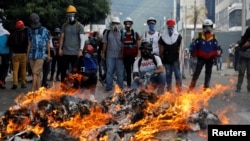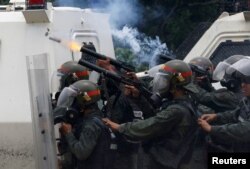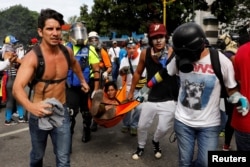Minutes after Venezuelan lawmakers led off thousands on a march Wednesday to protest President Nicolas Maduro's plan to rewrite the nation's constitution, government security forces stopped them short with clouds of tear gas and other demonstrations of force.
The marchers, some carrying handmade white shields emblazoned with red crosses, were en route to the National Assembly building in the capital city of Caracas.
"We were the deputies in front with credentials in hand, intending to arrive at the Assembly, and we have been repressed," said Franco Casella, a lawmaker in the South American country's opposition-led congress. He said the government uses force "to violate the rights of its citizens."
Opposition leaders have vowed to keep up the protests, which have been sustained for more than a month and left 32 people dead. They're calling on Maduro to step down, blaming him for the country's failing economy.
The president accuses his opponents of trying to overthrow him and says the protests, with their accompanying violence, require him to shake up the Venezuelan government.
"I see congress shaking in its boots before a constitutional convention," Maduro said of the legislature, speaking to supporters gathered Wednesday outside the National Electoral Council.
Widespread condemnation
Maduro's call for a constituent assembly has drawn condemnation from several Latin American leaders and the United States, which warned it might impose more sanctions on Venezuelan officials in response to the move.
On Wednesday, a group of U.S. senators led by Democrat Ben Cardin and Republican Marco Rubio introduced bipartisan legislation "to provide humanitarian assistance for the Venezuelan people … and to defend democratic governance and combat widespread public corruption" in the South American country, according to a Senate news release on the bill.
"It is in the strategic interest of the United States to support the restoration of democracy in Venezuela," Cardin, the Senate Foreign Relations Committee's ranking member, was quoted as saying.
The bill includes funding for vital medicine and food supplements, along with technical assistance to improve distribution. Among other things, it also calls for an intelligence report on corruption and drug trafficking by Venezuelan government officials.
Tillerson: 'A real tragedy'
In remarks to U.S. State Department employees about the Trump administration's foreign policies, Secretary Rex Tillerson called the situation in Venezuela "a real tragedy" and spoke of coordinated efforts to help restore democracy there.
"… We're hopeful that [by] working with others, including interventions by others in Europe, that we may be able to gain some traction in Venezuela," Tillerson said.
Maduro announced plans for the constituent assembly on Monday night, ostensibly in an effort to foster peace in a country that has been racked with triple-digit inflation, food shortages and surging crime numbers.
"This will be a citizens' assembly made up of workers," he said. "The day has come, brothers. Don't fail me now."
Maduro didn't reveal many details about how the assembly would be selected, leading opposition members to speculate that the president would fill the government body with friendly socialists.
They called Maduro's move a scheme to delay regional elections scheduled for this year, which polling suggests would hand big losses to Maduro and his socialist allies.
"This constituent assembly seeks to impose a Cuban electoral model," said opposition lawmaker Jorge Millan. "We Venezuelans are not going to allow fraud."






